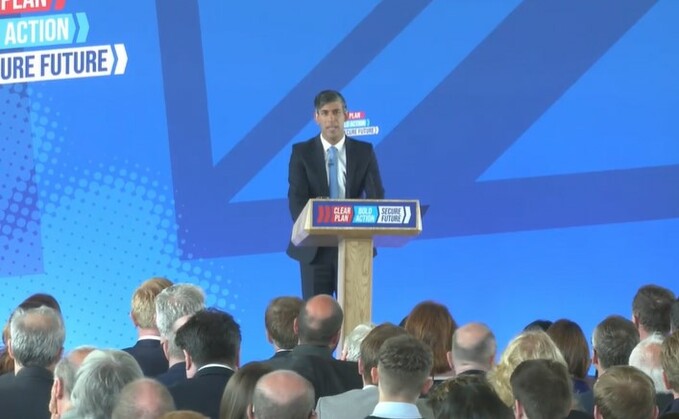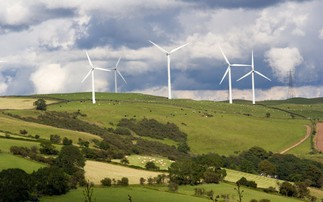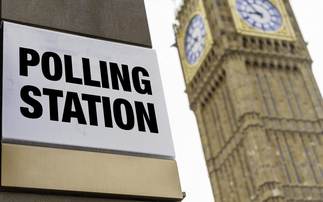Prime Ministers promises 'sensible' approach to meeting net zero targets, but green groups warn lack of ambitious new climate policies represent 'car crash for the planet'
Prime Minister Rishi Sunak has been accused of delivering a manifesto that "reads like a car crash for the planet", after the Conservatives this morning unveiled a new package of policy proposals that included only a handful of new climate policies.
Launching the new manifesto at an event at Silverstone, Sunak repeatedly highlighted how a Conservative government would pursue a more "sensible" approach to the net zero transition that would aim to minimise costs for households and prioritise energy security.
"It is only by having reliable home-grown source of energy that we can deny dictators the ability to send energy boils soaring," he said. "So in our approach to energy policy we will put security and your family finances ahead of unaffordable eco-zealotry."
He also attacked Labour's plans for a new state-backed clean energy investment vehicle, arguing that Conservatives "don't believe we will achieve energy security with a state-controlled energy company that does not actually produce any energy" and warning the Opposition's plan would "only increase costs" for households.
He added that a Conservative government would take a different approach to boosting domestic energy generation that would "achieve energy security through new gas power stations, trebling our offshore wind capacity, and having new fleets of small modular reactors".
"These will make the UK a net exporter of electricity, giving us greater energy independence and security from the aggressive actions of dictators," he said. "With our plan we will produce enough electricity to both meet our domestic needs and export to our neighbours. A clear Conservative plan not only generating security, but also prosperity for our country."
Sunak also highlighted the government's record in halving emissions since 1990, but the manifesto's lack of ambitious new decarbonisation policies and the commitment to build new gas fired power plants resulted in a damning assessment from green groups, which have repeatedly warned the UK is off track to meet its climate goals.
"Silverstone may have been the setting for the launch of this manifesto but it reads like a car crash for the planet," said Greenpeace UK's policy director, Doug Parr. "New gas plants and more dependence on the very fossil fuels that caused the cost of living crisis will only result in higher bills, more energy insecurity and increase our climate-wrecking emissions. We need a clean break from 14 years of failure on climate and nature but this is a manifesto that will drive us further into crisis... You can't have a 'secure future' without tackling soaring bills from fossil fuels, and the climate crisis from driving heatwaves, storms and floods and the collapse of our natural world."
The UK Green Building Council, which represents leading businesses from across the construction and property industry, offered a similarly critical assessment of the Conservatives' plans.
"The manifesto doesn't go anywhere far enough on addressing the linked climate, nature and cost-of-living crises we are facing," said Simon McWhirter, deputy chief executive at the UK Green Building Council. "We still need a 'Clear Plan' to rapidly decarbonise the country, and upgrade people's homes and town centres. We need to see the 'Bold Action' to address the millions of damp, dangerous and expensive-to-run properties, and protect our communities from climate risks. Instead of inspiring and galvanising us to action, these Conservative commitments add uncertainty and risk, rather than promising a 'Secure Future'."
The manifesto largely confirms the government's existing climate, energy, and nature policy plans, while proposing a handful of new measures designed to reduce the risk of additional costs for households and boost clean energy development.
Most notably it promises to ensure "green levies on household bills are lower" and proposes new guarantees ruling out the introduction of further green levies, road pricing schemes, or a frequent flyer levy.
It also promises to guarantee a vote in the next Parliament on the next wave of Carbon Budgets, "with adoption of any new target accompanied by proper consideration of the plans and policies required to meet the target, to maintain democratic consent for the big decisions that net zero will mean for our country".
And it pledges to reform the Climate Change Committee (CCC) to give it "an explicit mandate to consider cost to households and UK energy security in its future climate advice". However, some experts noted the CCC is already required to consider the impact of its recommendations on households and energy security.
Other new proposals include plans to introduce a legally binding target to enhance UK food security and boost the budget for nature-friendly farming schemes, cut red tape for tree-planting schemes, and approve two new fleets of Small Modular Reactors within the first 100 days of the next Parliament, while halving the time it takes for new nuclear reactors to be approved.
The manifesto also confirms the £6bn budget for energy efficiency schemes over the next three years and proposes a new energy efficiency voucher scheme, which would be "open to every household in England, to support the installation of energy efficiency measures and solar panels, helping families lower their bills".
More broadly the manifesto confirms the Conservatives' intention to take forward a wide range of policies that were paused by the calling of the early election.
On energy, it promises to revive the controversial plan to pass legislation requiring annual oil and gas drilling licensing rounds, treble offshore wind capacity, confirm a new large scale nuclear project in North Wales, deliver two new carbon capture hubs, and invest £1.1bn through the Green Industries Growth Accelerator.
It also reiterates plans to introduce a Carbon Border Adjustment Mechanism in 2027, enact the Winser Review to speed up grid connections, and signals its support for locational pricing for the wholesale electricity market.
However, it fails to include proposals for significant planning reform, which the energy industry has repeatedly argued is essential to deliver new clean energy infrastructure and drive down costs, and proposes a 'presumption in favour' of moving new pylons underground where cost competitive - an approach developers have warned could push up costs.
More to follow…










